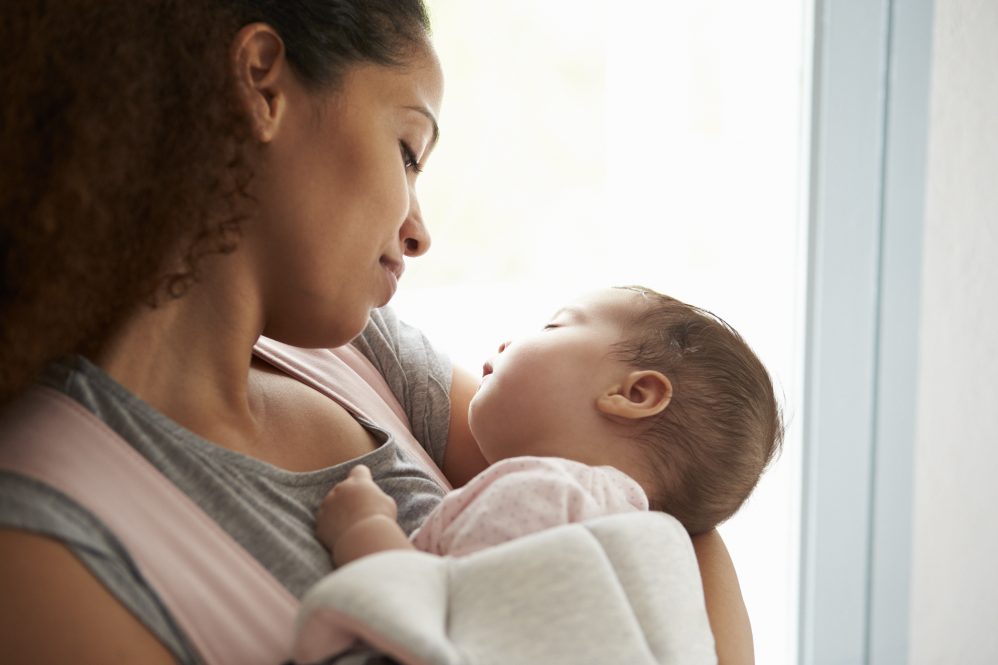The COVID-19 pandemic has profoundly changed our everyday lives. For many, it has increased exposure to significant stressors as they have faced the sickness or death of loved ones, job loss, working from home, social isolation, and other impacts.
UConn Health associate professors of psychiatry Damion Grasso and Margaret Briggs-Gowan have received a $3.1 million grant from the Eunice Kennedy Shriver National Institute of Child Health and Human Development to study pandemic-related experiences and stress among families who have given birth during the pandemic.
In March 2020, when the pandemic began taking a hold in the U.S., Grasso, Briggs-Gowan, and colleagues developed a new tool for measuring pandemic-related stress. The Epidemic-Pandemic Impacts Inventory (EPII) assesses pandemic-related experiences across several domains with questions about job loss, childcare, domestic violence and abuse, social distancing, and physical and mental health. The EPII has been included in the NIH Disaster Research Response Assessment Repository and is being used by more than 100 research teams around the world.
The novelty of the EPII is that it emphasizes the assessment of lived experiences, rather than primarily focusing on people’s perceptions of stress, which was the focus of other existing and emerging tools.
“Both are important,” Grasso says. “But I think it helps to identify particularly risky experiences or combinations of experiences of families that might help inform public health interventions to support families during similar crises.”
The researchers gained preliminary data from a sample in the northeast United States, finding evidence that unique patterns of pandemic-related experiences were differentially associated with risk for depression, anxiety, and posttraumatic stress symptoms.
In another study funded by the Institute for Collaboration on Health, Intervention, and Policy (InCHIP), Grasso found a link between cumulative pandemic-related stressors and psychosocial risk in a sample of mothers of young children living in the Greater Hartford area.
Briggs-Gowan and Grasso will now recruit a sample of 2,000 families who gave birth during the pandemic to study how unprecedented stress brought on by the pandemic has impacted caregiver and infant experiences.
During the perinatal period – the weeks immediately preceding and following birth – environmental stressors and caregiver mental health can have a tremendous impact on infants’ well-being, development, and even cellular functions. However, scientists do not yet have a full picture of how these mechanisms work, especially during a large-scale disaster like the COVID-19 pandemic.
Grasso and Briggs-Gowan will test the hypothesis that perinatal stress, worsened by the current pandemic, is linked to caregiver post-traumatic stress and to difficulties regulating negative emotions. These factors shape infants’ environment, and influence their own stress responses and developing abilities to regulate themselves through biobehavioral processes like DNA methylation and accelerated cellular aging.
Based on parents’ responses on the EPII, the researchers will identify unique profiles of various types and quantities of stress exposure. Using this information, they will recruit 400 mothers into a special sub-study which will have a high-stress and low-stress group.
The researchers will then conduct remote interviews with these mothers to better understand their experiences being pregnant, giving birth, and raising a newborn during the pandemic.
The researchers also plan to engage fathers, who are often left out of early childhood research, to understand how the pandemic has impacted their mental health and caregiving.
To study the biological impacts of pandemic-related stress, the researchers will collect DNA samples from the infants. They will compare epigenetic changes between high and low stress groups that may explain individual differences in how infants respond to stress. Differential DNA methylation and telomere shortening associated with early life stress.
The researchers are recruiting a diverse sample of families, ensuring representation of ethnic minorities like Latino families who often experience disparities and discrimination in healthcare.
“We know there’s a gap in knowledge and research in ethnic minority populations, so we want to help fill that gap,” Grasso says.
Co-Investigator Rocio Chang, also in the Department of Psychiatry, is leading efforts to connect with agencies serving ethnic minority families, including the Hispanic Health Council and its affiliates.
This study will have impacts beyond the current pandemic by providing a nuanced understanding of the ways COVID-19 has shaped people’s lives and the impact these events have on biological processes. This understanding can help inform public health interventions to support caregivers and infants who have undergone significant stressors.
Recruitment is ongoing and is being supported by a number of healthcare and community agencies across the state that serve families of young children.
“The knowledge gained from this study will inform our understanding of future public health disasters, particularly those that are so far-reaching and have to do with infection,” Grasso says.
Individuals interested in participating in this study should visit our Parenting Infants in the Pandemic (PIP) Study webpage: bit.ly/uconn-pips
Grasso is a licensed clinical psychologist. He holds a Ph.D. from the University of Delaware. His research focuses on understanding biobehavioral mechanisms involved in trauma- and stress-related disorders in children and effective strategies for assessing and treating trauma-related impairment.
Briggs-Gowan holds a Ph.D. in developmental psychology from Yale University. Her research broadly focuses on mental health problems in young children, including identifying risk factors, and pinpointing underlying genetic, stress-response, and neurocognitive factors involved in these processes.



